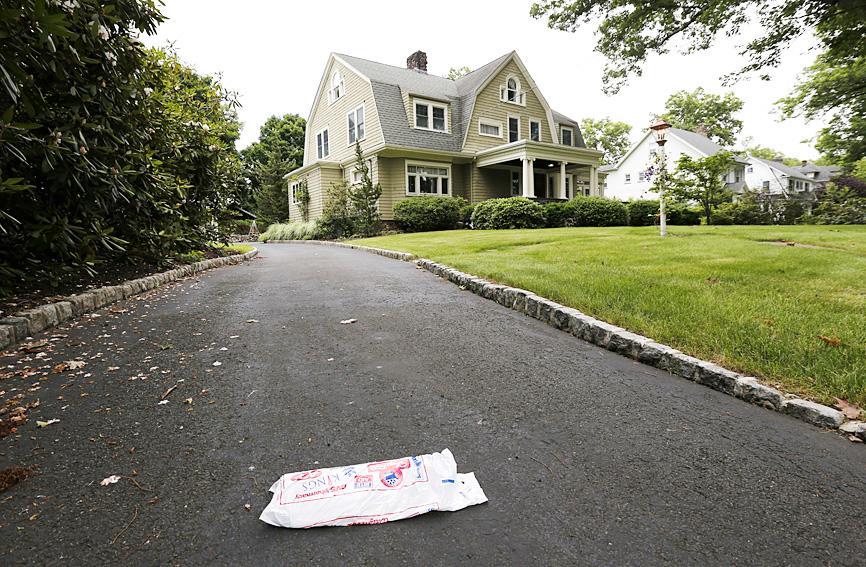In Little Italy in Boston, Massachusetts, where tourists juggle coffee and cannoli, there is a 3m-wide monument to revenge on the market that could be yours for US$1.2 million.
It is a spite house.
An unusual architectural phenomenon, the property was built not with hope and love, but with venom and Machiavellian planning, with the intention of irritating the neighbors.

Photo: AP
It was reportedly built in 1862 and was the product of a feud between two brothers who inherited land from their father. When one brother returned from the civil war, he found his battle-shy sibling had constructed his own home on the lion’s share of the property, leaving him a plot measuring about 37m2.
In retaliation, he erected the four-story home — directly in front of his brother’s, so that it blocked the light and view.
“You see that section of jagged wall?” said Vito, the real-estate agent selling the property. “That’s what’s left of the first brother’s house. We know who won.”
A property is considered “stigmatized” by the National Association of Realtors (NAR) if it is “psychologically impacted by an event which occurred, or was suspected to have occurred, on the property, such event being one that has no physical impact of any kind.”
A building might be stigmatized because of a feud such as the Boston house, or a death. The building could be the former site of meth lab, the home of a cult or, in some areas, a place that is allegedly haunted.
While about half the states in the US operate under some form of caveat emptor, Latin for “buyer beware,” putting the due diligence on the purchaser, the other half obligate sellers to disclose “stigmas” or void the sale.
“It’s complicated,” NAR associate counsel Deanne Rymarowicz said. “A seller can be subject to a law ... that’s completely different to the town next door.”
As of 2019, at least nine states have death disclosure laws, Zillow said.
The strictest, California, requires mention of deaths in the past three years. In South Dakota, a seller must reveal if a murder took place. In Texas, that is not necessary.
Minnesota and Massachusetts, home of 17th-century witch trial city Salem, tell sellers they do not need to disclose any paranormal happenings, but New Jersey requires them to confess if asked.
New York is the only state where, in some circumstances, it is illegal to sell a haunted house, thanks to the 1991 “Ghostbusters ruling.”
It started in 1989, when the Ackley family put their five-bedroom 1890s home in Nyack, New York, up for sale.
Unbeknown to buyer Jeffrey Stambovsky, the family had a history of discussing paranormal activity in the building, including their daughter’s bed rattling, and were once interviewed by Reader’s Digest. After making his down payment, Stambovsky was told by the agent, and decided to sue.
Remarkably, the case made it all the way to the New York Supreme Court’s appellate division, which voted three to two in his favor, rescinding the sale.
The new law made it illegal to conceal if a building had been marketed as “haunted,” because it could negatively affect the value.
The late Justice Israel Rubin wrote: “As a matter of law, the house is haunted.”
While 40 percent of Americans supposedly believe in ghosts, according to YouGovAmerica, inking it into law is unusual.
“Whether the buyer believes in the paranormal is sometimes irrelevant,” said Randall Bell, who was once called “Dr Disaster” and is considered to be the US’ top property damage economist and expert on “stigmatized” buildings.
He estimates that if a murder took place in a house, it can cause a 10 to 25 percent loss in value.
“I know of a property in Jersey where [a family] bought a house where there had been a murder, which didn’t bother them, but they neglected to think about its reputation. It wrecked birthday parties, barbecues ... all the things people do to make new friends,” he said.
In other words, ghosts are not the problem, humans are.
A harrowing example is the Watcher House. In 2014, the Broaddus family bought a 1905 home in Westfield, New Jersey, for US$1.4 million, and shortly afterward, frightening letters began to arrive.
“I am The Watcher. Bring me your young blood,” one said.
They sued the previous owners, who reportedly also received letters, but New Jersey’s laws have fewer protections for buyers of stigmatized properties than New York, less than 16km away. They lost.
After years of fear, broken neighborly relationships and failed police investigations, the Broaddus family accepted a US$440,000 loss when they sold in 2019. Netflix bought the rights to their story.
Another family who had a similar experience spoke on condition of anonymity, out of fear of “small-town America.”
“I lived that nightmare. What happened to my family was overwhelming,” one member of the family said. “The reality is the people who sold us the house did not tell us the truth and got away with it. If it happened in New York ... we would have gotten our money back. As it is, it nearly destroyed us. The laws are so obtuse and unfair.”
There are few federal laws governing the sale of stigmatized buildings, but in the 1980s, buyers were prevented from suing if someone died in the home from AIDS.
Last year, the NAR advised that properties should not be “stigmatized” by COVID-19.
A big problem, realtors said, is that the Internet makes it difficult for events to fade from memory, so some owners resort to demolishing their home or changing its address to try to outsmart Google.
However, not all haunted homes lose money.
The Ackley Ghostbusters house was sold by the singer Matisyahu for US$1.8 million in March, 160 percent higher than the local average. In May, a bed and breakfast and museum in Fall River, Massachusetts, where Lizzie Borden was accused of murdering her parents with a hatchet in 1892, sold for US$2 million.
Buyer Lance Zaal, founder of US Ghost Adventures, said: “It isn’t scary. It can be an advantage, from a business perspective.”
Along with themed shot glasses and a souvenir doll, the tour company offers “romantic” stays where couples sleep in the rooms where bodies were found, on beds scattered in rose petals.
“We have a new feature where you can pay to leave an axe under someone’s pillow,” he added.

South Korea’s equity benchmark yesterday crossed a new milestone just a month after surpassing the once-unthinkable 5,000 mark as surging global memory demand powers the country’s biggest chipmakers. The KOSPI advanced as much as 2.6 percent to a record 6,123, with Samsung Electronics Co and SK Hynix Inc each gaining more than 2 percent. With the benchmark now up 45 percent this year, South Korea’s stock market capitalization has also moved past France’s, following last month’s overtaking of Germany’s. Long overlooked by foreign funds, despite being undervalued, South Korean stocks have now emerged as clear winners in the global market. The so-called “artificial intelligence

Chinese artificial intelligence (AI) start-up DeepSeek’s (深度求索) latest AI model, set to be released as soon as next week, was trained on Nvidia Corp’s most advanced AI chip, the Blackwell, a senior official of US President Donald Trump’s administration said on Monday, in what could represent a violation of US export controls. The US believes DeepSeek will remove the technical indicators that might reveal its use of American AI chips, the official said, adding that the Blackwells are likely clustered at its data center in Inner Mongolia, an autonomous region of China. The person declined to say how the US government received

FORTUNES REVERSED: The new 15 percent levies left countries with a 10 percent tariff worse off and stripped away the advantage of those with a 15 percent rate In a swift reversal of fortunes, countries that had been hardest hit by US President Donald Trump’s tariffs have emerged as the biggest winners from the US Supreme Court’s decision to strike down his emergency levies. China, India and Brazil are among those now seeing lower tariff rates for shipments to the US after the court ruled Trump’s use of the International Emergency Economic Powers Act to impose duties was illegal. While Trump subsequently announced plans for a 15 percent global rate, Bloomberg Economics said that would mean an average effective tariff rate of about 12 percent — the lowest since

Standard Chartered Bank Taiwan’s newly appointed chief executive officer, Anthony Yu (游天立), yesterday unveiled an ambitious growth strategy for the bank’s wealth management division, reflecting a bullish outlook on Taiwan’s high-net-worth market. Yu, the first local executive to lead Standard Chartered Bank’s Taiwan operations, emphasized rising client demand and detailed plans to expand the bank’s digital capabilities, as well as its physical presence across the country. Standard Chartered Taiwan saw a remarkable surge in new wealth management clients last month, with the number of clients holding assets equivalent to US$1 million more than doubling compared with the same month last year, he